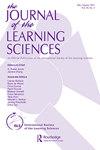以学生为导向的讨论之策划:知识中介的课程意义建构之启示案例
IF 3.9
1区 教育学
Q1 EDUCATION & EDUCATIONAL RESEARCH
引用次数: 6
摘要
背景教师需要理解课程材料和设计教学,以确保学生在课程设置中能够追求自己的探究轨迹。整个小组讨论是课程意义制定的重要机会,然而计划和实施可能具有挑战性。方法采用单一的、启发性的案例研究方法,由一位重点教师来研究故事情节材料中认知代理的课程意义。我们在教师访谈前后的回应和参与讨论计划周期(DPCs)中发现了认知代理的教学推理情节。这一分析揭示了反复出现的紧张和模棱两可的来源,教师努力与有关的认识代理。发现教师能够理解课程连贯和学生寻求连贯这两个紧张的主要来源;公平参与和渐进式思想建设;歧义的一个来源是:在不同的讨论类型中,认知代理的统一或可变形式。老师努力应对这些紧张和模糊,并学会利用它们来定位学生在学习中的认知代理。教师为认知代理参与课程意义建构。这种形式的意义建构涉及教师努力与学生的突发想法和参与他们使用课程材料。本文章由计算机程序翻译,如有差异,请以英文原文为准。
Planning for student-driven discussions: A revelatory case of curricular sensemaking for epistemic agency
ABSTRACT Background Teachers need to make sense of curricular materials and design instruction to ensure students will be positioned to pursue their own arc of inquiry in curriculum enactment. Whole-group discussions are crucial opportunities for curricular sensemaking, yet planning and enactment can be challenging. Methods We used a single, revelatory case study approach with one focal teacher to research curricular sensemaking for epistemic agency in storyline materials. We identified episodes of pedagogical reasoning for epistemic agency in the teacher’s pre- and post-interview responses and participation in discussion planning cycles (DPCs). This analysis revealed the recurrent sources of tension and ambiguity that the teacher grappled with concerning epistemic agency. Findings The teacher made sense of two key sources of tension: curricular coherence and student coherence-seeking; equitable participation and incremental building of ideas; and one source of ambiguity: uniform or variable form(s) of epistemic agency in different discussion types. The teacher grappled with these tensions and ambiguity and learned to leverage them to position students with epistemic agency in their learning. Contribution The teacher engaged in curricular sensemaking for epistemic agency. This form of sensemaking involves the teacher’s efforts to engage with students’ emergent ideas and participation in their use of curricular materials.
求助全文
通过发布文献求助,成功后即可免费获取论文全文。
去求助
来源期刊

Journal of the Learning Sciences
Multiple-
CiteScore
10.70
自引率
5.30%
发文量
17
期刊介绍:
Journal of the Learning Sciences (JLS) is one of the two official journals of the International Society of the Learning Sciences ( www.isls.org). JLS provides a multidisciplinary forum for research on education and learning that informs theories of how people learn and the design of learning environments. It publishes research that elucidates processes of learning, and the ways in which technologies, instructional practices, and learning environments can be designed to support learning in different contexts. JLS articles draw on theoretical frameworks from such diverse fields as cognitive science, sociocultural theory, educational psychology, computer science, and anthropology. Submissions are not limited to any particular research method, but must be based on rigorous analyses that present new insights into how people learn and/or how learning can be supported and enhanced. Successful submissions should position their argument within extant literature in the learning sciences. They should reflect the core practices and foci that have defined the learning sciences as a field: privileging design in methodology and pedagogy; emphasizing interdisciplinarity and methodological innovation; grounding research in real-world contexts; answering questions about learning process and mechanism, alongside outcomes; pursuing technological and pedagogical innovation; and maintaining a strong connection between research and practice.
 求助内容:
求助内容: 应助结果提醒方式:
应助结果提醒方式:


